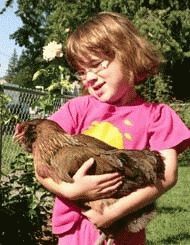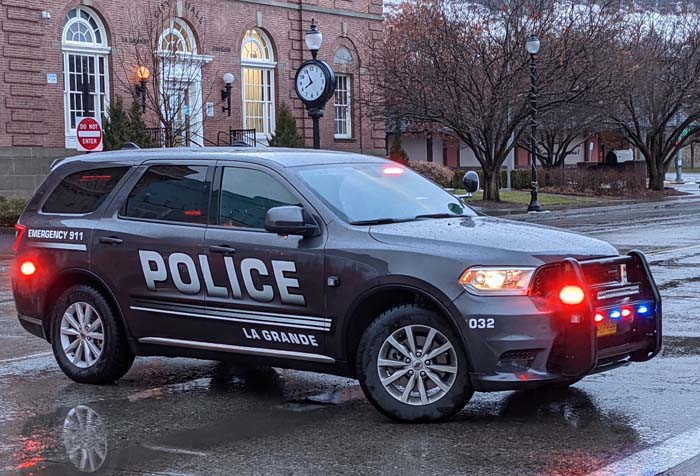LIVESTOCK OR PETS?
Published 12:00 am Monday, October 9, 2006

- CHICKEN LESSONS: Kiana Sweaney, 6, holds one of three pet chickens she keeps in a backyard chicken coop in La Grande. Besides learning to be responsible for caring for her pets, she is learning a valuable lesson in civics, Kiana's parents say, as they pursue changes to the La Grande livestock ordinance. (The Observer/CHRIS BAXTER).
– Mardi Ford
Trending
– The Observer
More than 15 residents crowded into the already full chambers, lining the walls for a standing-room only La Grande City Council meeting Sept. 20. They brought children, banners and their support for what they had deemed a worthy cause.
As more folks continued to file in, Mayor Colleen Johnson’s eyes continued to widen.
Trending
What issue on the agenda had packed council chambers like this? Increasing garbage rates? Contested street vacations? Surely not the pending approval for the sale of old library shelving.
Nope it was the chickens.
Three hens to be exact: Pollyanna, Julie and Chicken Little, named by their owner and pint-sized political activist, 6-year-old Kiana Sweeney.
As Kiana and her mother, Sharon Trimble, 501 Washington Ave., stepped up to the podium for public comment, Kiana held onto a scrapbook bursting with chicken memories. The letter Kiana wrote to Santa Claus asking for either a pony or chickens. Pictures of Kiana on Easter Sunday, when the long awaited baby chicks finally arrived. Pictures of Kiana and her dad, Mike Sweeney, building a chicken coop after the hens grew too big to stay in the house. An invitation to, and pictures of, the ensuing neighborhood coop warming and potluck attended by more than 40 other chicken lovers, where everything was allowed on the menu except of course chicken.
"We didn’t think it was a good idea to have fried chicken at their party," says Kiana.
Yes, it was all going pretty well for Kiana and her backyard chickens.
Until later on last summer.
Windows left open during warm summer nights brought the sounds of egg laying and hen cackling floating into a neighbor’s bedroom window at 4 in the morning.
Driven by the desperation of multiple nights of sleep deprivation, the prefers-to-remain-anonymous complainant finally called the city to lodge a complaint about livestock in the city limits.
The chickens were busted, the city said, and they had to go.
The ordinance was changed in 1993, he added, making La Grande the only town in Union County where residents must comply with such strict rules about backyard goats, lambs, rabbits, poultry (i.e., chickens, ducks and geese) or even guinea pigs, which believe it or not technically qualify as livestock according to the city’s ordinance, Boquist said.
The city planner said he wouldn’t even begin to guess how many folks in La Grande are in violation of the current city ordinance. Many of them, like Kiana’s family, may not even be aware they are violating the law.
Councilman Steve Clements had been contacted by Sharon Trimble and Mike Sweeney about their chicken problem and encouraged them to make use of the process and attend the council meeting to speak during the public comment period.
Trimble fought to maintain composure, as Kiana pranced in front of the council bench proudly showing off her scrapbook.
"It was either this or a pony. We really had no idea we were doing anything wrong. There are people all over our neighborhood who either have chickens or want them," the kindergarten teacher said. "These chickens aren’t livestock, they’re my daughter’s pets."
When the council asked to see a show of hands in support of the Trimble-Sweeney family and their chickens, more than half of those in the room raised their hands. A few took advantage of the public comment period to voice support, as well.
"Do you all have chickens, too? No, better not answer that one," joked Clements. "I run all over this town down alleys and everywhere. I can tell you there are backyards full of chickens and rabbits which fall into the same classification all over this town," said Clements. "Maybe we should take a look at this. At the least, maybe there needs to be some flexibility in the language."
Kiana’s parents are realistic when it comes to the fate of their chickens and taking on the process to change a city ordinance.
"We know we may not be able to keep the chickens much longer," said Kiana’s father, Mike Sweeney. "But there is a lot of support for us and, whatever it takes, we’re going to see if we can’t get this ordinance changed."
The next step is that the family will appear in municipal court to answer charges of violating the city ordinance. At some point, Sweeney said, they hope to have a chance at a hearing to plead their case. Although Pollyanna, Julie and Chicken Little may qualify as livestock according to the city, the hens’ owners will argue they are pets.
Why chickens? Why not a cat or a dog or a turtle?
"’Cause they’re cute and they’re soft and I love ’em. Chickens make good pets," Kiana answered.
Although Boquist certainly understands Kiana’s parents’ dilemma, he holds little hope for an outcome favorable to the chickens if the case gets a hearing.
"Even if the judge wanted to do something right now (to let them keep the chickens), I don’t see how he could. The livestock ordinance would have to be changed and that is a six-month process," Boquist said.
Boquist agrees with Clements that there probably are a staggering number of
La Grande residents keeping backyard livestock as pets without realizing they are in violation of a city ordinance.
"These people just got caught. We get a complaint and we investigate," Boquist said.
He added that recently the idea of a change in the ordinance to allow a more flexible interpretation was considered, but didn’t get off the ground. He welcomes a discussion about such a change, even looking at short-term 4-H or FFA projects, within the proper zoning and property sizes.
If the public organized, Boquist said, and presented a strong enough case to the city council for such a change, the idea might just have a leg to stand on.








